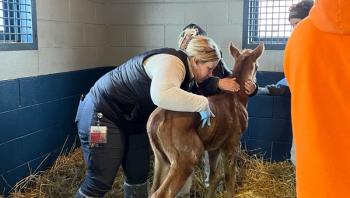
U.S. Senate committee passes veterinary provisions in 2012 farm bill
AVMA commends Agriculture Committee for maintaining existing programs, introducing new initiatives.
On April 26, the Senate Agriculture Committee passed several veterinary-related provisions in the 2012 Farm Bill. The American Veterinary Medical Association (AVMA) says it is pleased that the committee included these provisions, which it says will improve animal health and welfare, provide valuable agriculture research and improve food safety.
Looking to the future: According to the AVMA, the 2012 farm bill will help protect the agricultural industry, provide a safe food supply and help the economy.
"The AVMA commends the work done by Senate Agriculture Committee Chairwoman Sen. Debbie Stabenow (D-Mich.) and Ranking Member Sen. Pat Roberts (R-Kan.) for their bipartisan efforts to develop a bill that includes key programs essential to ensuring animal health and welfare while at the same time bolstering veterinary services where they are needed most," AVMA President René Carlson, DVM, said in a prepared statement. "The AVMA looks forward to our continued work with Congress to pass a farm bill this year. In these tough economic times this legislation takes steps to reduce the deficit while also providing necessary funding to programs that will increase the nation's ability to provide a safe and abundant food supply, protect and enhance our country's agriculture industry and help the economy."
Specifically, the AVMA notes, the legislation as passed by the committee will:
- Maintain the Veterinary Medicine Loan Repayment Program, which contracts with veterinarians in areas of the country most in need of livestock or public health veterinary services.
- Maintain funding for the Food Animal Residue Avoidance Databank, a tool that ensures milk, meat and eggs are free of drug or contaminant residues.
- Maintain funding for the Agriculture and Food Research Institute while underscoring the need for the agency to pursue stakeholder input.
- Maintain the Animal Health and Disease Research program, a source of funds for research on diseases impacting livestock.
- Establish a foundation for food and agriculture research. The foundation will solicit and accept private donations to fund research activities focused on key animal, agriculture and environmental issues of national and international significance.
- Establish the Veterinary Services Grant program to meet veterinary workforce or food protection needs in designated areas.
- Establish a Wildlife Reservoir Zoonotic Disease Initiative to develop surveillance methods, vaccinations, delivery systems and diagnostic tests for Brucella abortus, Mycobacterium bovis and other zoonotic diseases in livestock.
Not included in the legislation was a formal authorization of the National Animal Health Laboratory Network (NAHLN). The AVMA says this network of laboratories, which recently confirmed the nation's fourth case of bovine spongiform encephalopathy (BSE) in a dairy cow from central California (see page 18), is instrumental to the nation's animal disease surveillance system. The AVMA will also seek to include formal authorization of the Minor Use Animal Drug Program (MUADP), which it says American minor species producers rely on to secure safe and effective products to keep their livestock healthy.
The current five-year farm bill expires at the end of September.
Newsletter
From exam room tips to practice management insights, get trusted veterinary news delivered straight to your inbox—subscribe to dvm360.




